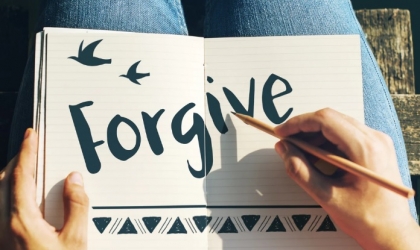The Power of Forgiveness: A Path to Inner Peace
Forgiveness is a powerful yet often misunderstood concept. It is more than a moral obligation or an act of kindness; it is a profound release that can transform lives. While many people view forgiveness as something we offer others, it is also a gift we give ourselves. Let's explore what forgiveness truly means, why it is so essential, and how we can cultivate it in our lives.
Understanding Forgiveness
Forgiveness does not mean forgetting or condoning the harm done to us. It is not about minimizing the pain or pretending that the hurt never happened. Instead, forgiveness is about freeing ourselves from the chains of resentment and anger. It is a conscious decision to let go of the negative emotions that hold us back and to move forward with a sense of peace and understanding.
At its core, forgiveness is about changing our relationship with the past. It allows us to reclaim our power and to no longer be defined by the actions of others. It is about recognizing that holding onto grudges and bitterness only harms us, not the person who wronged us.
The Importance of Forgiveness
The benefits of forgiveness are profound and far-reaching. Here are some reasons why forgiveness is essential for our well-being:
1. Emotional Healing
Holding onto anger and resentment can take a toll on our emotional health. It can lead to chronic stress, anxiety, and even depression. Forgiveness helps to release these negative emotions, promoting emotional healing and resilience.
2. Physical Health
The mind and body are deeply interconnected. Chronic stress and negative emotions can contribute to various health issues, including high blood pressure, heart disease, and weakened immune function. Forgiveness has been shown to reduce stress and improve overall physical health.
3. Improved Relationships
Forgiveness can mend broken relationships and foster a sense of understanding and compassion. It allows us to move beyond conflicts and misunderstandings, paving the way for healthier and more meaningful connections.
4. Personal Growth
Forgiveness is a journey of self-discovery and growth. It requires us to confront our pain, reflect on our values, and develop empathy and compassion. Through this process, we become stronger and more resilient individuals.
5. Inner Peace
Ultimately, forgiveness brings a sense of inner peace. It allows us to let go of the past and to live more fully in the present. It liberates us from the burden of carrying old wounds, enabling us to experience joy and contentment.
How to Cultivate Forgiveness
Forgiveness is not always easy, and it often requires time and effort. Here are some steps to help you cultivate forgiveness in your life:
1. Acknowledge the Hurt
The first step in the forgiveness process is to acknowledge the pain and hurt you have experienced. Allow yourself to feel the emotions without judgment. It is important to validate your feelings and to understand the impact of the hurt on your life.
2. Reflect on the Situation
Take some time to reflect on the situation and the person who wronged you. Try to understand their perspective and motivations. This does not mean excusing their behavior, but it can help to develop empathy and compassion.
3. Release Resentment
Holding onto resentment and anger only prolongs your suffering. Make a conscious decision to let go of these negative emotions. This may involve writing a letter to the person (even if you never send it), practicing mindfulness, or engaging in activities that bring you joy and peace.
4. Practice Self-Compassion
Forgiveness starts with self-compassion. Be kind and gentle with yourself as you navigate the forgiveness process. Recognize that it is okay to feel hurt and that healing takes time.
5. Seek Support
Forgiveness can be a challenging journey, and it is okay to seek support from others. This may include talking to a trusted friend or family member, joining a support group, or seeking professional counseling.
6. Focus on the Present
Letting go of the past allows you to focus on the present and to build a brighter future. Practice mindfulness and gratitude to stay grounded in the present moment. Appreciate the positive aspects of your life and the growth you have experienced.
7. Set Boundaries
Forgiveness does not mean allowing others to continue to hurt you. It is important to set healthy boundaries to protect yourself. This may involve distancing yourself from toxic individuals or situations.
8. Be Patient
Forgiveness is a process, and it may take time. Be patient with yourself and recognize that it is okay to take small steps. Celebrate your progress, no matter how small, and continue to move forward.
Forgiveness in Action
To illustrate the power of forgiveness, consider the story of Nelson Mandela. After spending 27 years in prison for his fight against apartheid, Mandela emerged not with bitterness, but with a message of reconciliation and forgiveness. He understood that holding onto anger would only perpetuate the cycle of violence and hatred. His willingness to forgive those who had wronged him helped to heal a divided nation and inspired millions around the world.
Another powerful example is that of Immaculée Ilibagiza, a survivor of the Rwandan genocide. Despite losing most of her family, she found the strength to forgive those responsible for the atrocities. Her story is a testament to the transformative power of forgiveness and the resilience of the human spirit.
Conclusion
Forgiveness is a powerful tool for healing and transformation. It is a journey that requires courage, empathy, and compassion. By letting go of anger and resentment, we free ourselves to live more fully and authentically. Forgiveness is not only an act of kindness towards others but also a profound act of self-love. As we cultivate forgiveness in our lives, we pave the way for inner peace, personal growth, and deeper, more meaningful connections. Embrace the power of forgiveness and experience the liberation it brings.



















